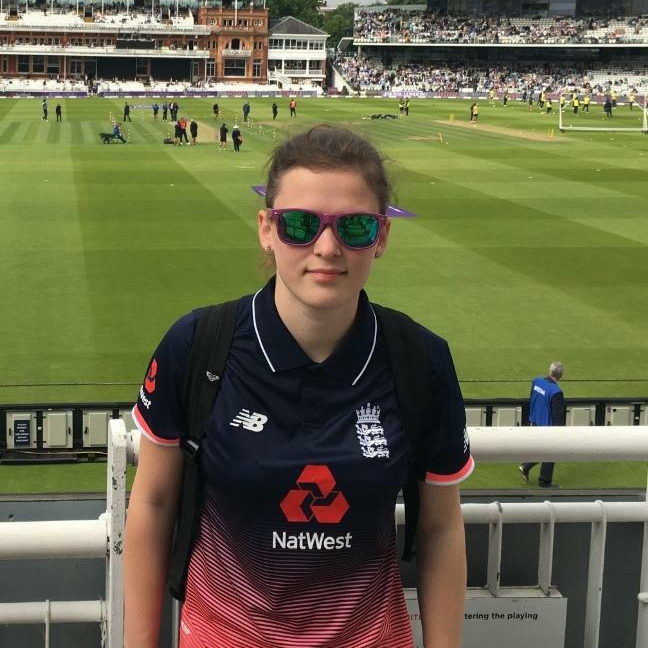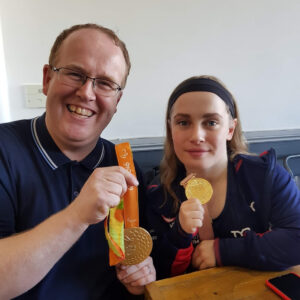Lucy Hunter: Cricket

Cricket fans will be familiar with the term ‘all-rounder’, someone who is good at both batting and bowling.
But Lucy Hunter is one in every sense.
Through her teenage years, she became a national T20 champion and played county cricket for Oxfordshire, while starring as a goalkeeper at academy level for Oxford United, and has more recently played futsal and cricket for her university, reaching the BUCS Nationals competition through the latter.
In addition to being a huge sports fanatic who will watch anything and everything, she loves history and maths, and has just graduated from the University of Worcester with a Sports Business Management degree, adding yet another string to her bow.
“I would be a pretty good TV quiz show partner,” she laughed. “I’ve done quizzes where I’ve got the sports round nailed, and I do well in general knowledge as well.”
Lockdown certainly did no harm to her versatile intelligence. After waking up at 5am for her regular six-hour morning shift at her Sainsbury’s bakery, Lucy would get home and take a nap, before indulging in sports documentaries and highlights, especially from events that she saw from the stands with her own eyes.
It provides her with more than just escapism, however. It allows her to reconnect with her past experiences – precious memories that can sometimes be forgotten due to her autism.
“I know things have happened because people have either told me or I’ve seen photos, but I don’t actually remember being in that situation as such, so watching the highlights is pretty cool – it makes me feel like I do remember,” she explained.
“As a Portsmouth fan, I watched the 2008 FA Cup final when they won. I was there the day after my ninth birthday, and I re-watched it the day after my 21st. I’d never seen the highlights before then.
“The 2005 Ashes, NFL games that I watched at Wembley five years ago; I’ll message my dad and say, ‘do you remember this?’”
Once crowds eventually return, Lucy will continue to enjoy sports fixtures more than ever before, for more reasons than just a renewed appreciation after its long-term absence.
“I watched sport almost every weekend when I was younger and I could cope for the duration of the game in a very loud crowd, but as soon as I left that situation, I’d be shattered for the next few days and I never clocked why until recently.
“I just thought it made me tired because I was young, but as I got older, it was a little bit strange. I love sport, but I didn’t realise the issues it was causing me until afterwards.
“I’ve learnt how to enjoy sport, and not get too overwhelmed at the same time. I’m paying to be there, so I’ll make sure it works with me, and now I have earplugs that I’ll wear.
“The day I got that autism diagnosis was my turning point. Before then, I was confused and didn’t know what was going on, so the moment I got that, I could learn to accept it and use it for a greater good. I couldn’t be happier.
“I find watching cricket, especially county cricket, absolutely fine. Nobody sits there with earplugs and there are not many people in the ground; it’s a very quiet game so it’s quite enjoyable.”
“Sport gives you structure, purpose, and an escape. When I was 15, I didn’t know I was autistic and I was very angry, but I found playing football and cricket released that frustration in a positive way.”
Lucy Hunter
But Lucy can also vouch for the playing side of the game having first picked up the sport aged nine and choosing to pursue it at the expense of other activities while studying for her A Levels.
“I’d recommend any sport, but cricket is a particularly good one for people with autism – it has set rules that hardly ever change, and every umpire is pretty strict with them.
“Sport gives you structure, purpose, and an escape. When I was 15, I didn’t know I was autistic and I was very angry, but I found playing football and cricket released that frustration in a positive way.
“This is not recognised enough in the autistic community.”
Nor does Lucy think that the social side is appreciated enough either. Even when she has felt exhausted from being around people all the time, she admitted it has taught her how to live her best life.
Now, as she approaches her master’s degree in International Sports Management, Lucy aspires to continue opening pathways for herself and others.
“Some of the best friends I’ve made, and some of the best experiences I’ve had, have been through sport. I’ve been really lucky some of the clubs I’ve been involved with were so accepting of who I am before they even knew anything.
“Seeing other people with other disabilities within cricket has made me realise [you should] be who you want to be.
“I was a federal assistant at the Physical Disability World Series last year – things like that I am well-suited to because I understand people’s situations, especially within sport.
“It was one of the best weeks of my life and gave me a greater appreciation for cricket and what else was out there.
“I’ve been offered so many opportunities since then by just doing something I would enjoy. With autism, I thought I would find it hard to get a job but getting into these situations and volunteering can give you great contacts for the future.”
On top of her postgraduate studies, Lucy plans to continue playing sport and learn how to drive, in addition to having some involvement with the International Inclusive Cricket Centre that is coming to Worcester – the future home for England’s disability teams.
Tomorrow seems sunny for Lucy, and she knows it can be for many other people with autism thanks to the amount of support that is available. But she admits more can still be done.
“There needs to be a greater difference in the association between male and female autism; it presents very differently.
“Autism in sport needs to be further explored in general – more people could come forward and say, ‘I have played top-level sport and I have an autism diagnosis’. Maybe they haven’t told anyone because they are embarrassed.
“With the amount of autistic athletes in the world, there must be at least a hundred of them that have an autism diagnosis and haven’t said anything.
“These are elite athletes and already respected role models, so if they speak up, that will encourage a lot of people in the future.”


